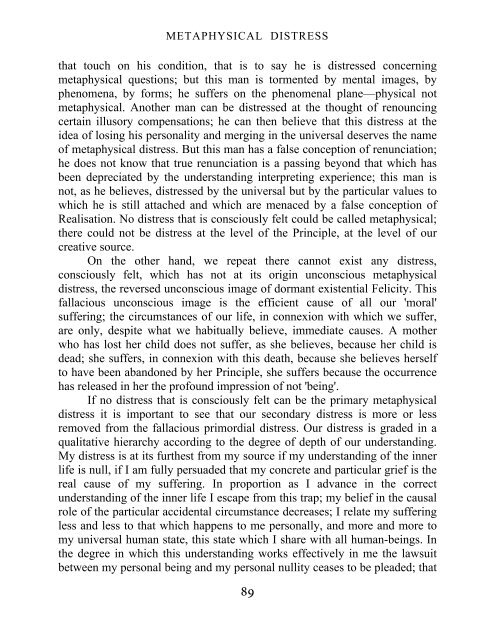The Supreme Doctrine - neo-alchemist
The Supreme Doctrine - neo-alchemist
The Supreme Doctrine - neo-alchemist
You also want an ePaper? Increase the reach of your titles
YUMPU automatically turns print PDFs into web optimized ePapers that Google loves.
METAPHYSICAL DISTRESS<br />
that touch on his condition, that is to say he is distressed concerning<br />
metaphysical questions; but this man is tormented by mental images, by<br />
phenomena, by forms; he suffers on the phenomenal plane—physical not<br />
metaphysical. Another man can be distressed at the thought of renouncing<br />
certain illusory compensations; he can then believe that this distress at the<br />
idea of losing his personality and merging in the universal deserves the name<br />
of metaphysical distress. But this man has a false conception of renunciation;<br />
he does not know that true renunciation is a passing beyond that which has<br />
been depreciated by the understanding interpreting experience; this man is<br />
not, as he believes, distressed by the universal but by the particular values to<br />
which he is still attached and which are menaced by a false conception of<br />
Realisation. No distress that is consciously felt could be called metaphysical;<br />
there could not be distress at the level of the Principle, at the level of our<br />
creative source.<br />
On the other hand, we repeat there cannot exist any distress,<br />
consciously felt, which has not at its origin unconscious metaphysical<br />
distress, the reversed unconscious image of dormant existential Felicity. This<br />
fallacious unconscious image is the efficient cause of all our 'moral'<br />
suffering; the circumstances of our life, in connexion with which we suffer,<br />
are only, despite what we habitually believe, immediate causes. A mother<br />
who has lost her child does not suffer, as she believes, because her child is<br />
dead; she suffers, in connexion with this death, because she believes herself<br />
to have been abandoned by her Principle, she suffers because the occurrence<br />
has released in her the profound impression of not 'being'.<br />
If no distress that is consciously felt can be the primary metaphysical<br />
distress it is important to see that our secondary distress is more or less<br />
removed from the fallacious primordial distress. Our distress is graded in a<br />
qualitative hierarchy according to the degree of depth of our understanding.<br />
My distress is at its furthest from my source if my understanding of the inner<br />
life is null, if I am fully persuaded that my concrete and particular grief is the<br />
real cause of my suffering. In proportion as I advance in the correct<br />
understanding of the inner life I escape from this trap; my belief in the causal<br />
role of the particular accidental circumstance decreases; I relate my suffering<br />
less and less to that which happens to me personally, and more and more to<br />
my universal human state, this state which I share with all human-beings. In<br />
the degree in which this understanding works effectively in me the lawsuit<br />
between my personal being and my personal nullity ceases to be pleaded; that<br />
89




